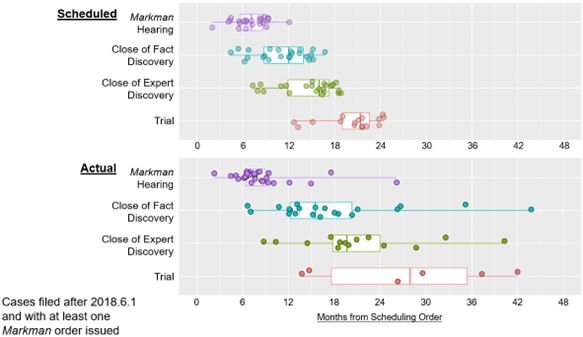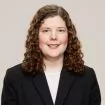Approximately seven years ago, effective May 24, 2018, the U.S. District Court for the District of Massachusetts amended Local Rule 16.6, titled "Patent Proceedings" (LR 16.6) (see our IP Update on the rule enactment here). LR 16.6 sets target dates for key events in a patent case, including a claim construction (i.e., Markman)hearing (within nine months of the initial scheduling conference (ISC)), trial (within 24 months of the ISC), the close of fact discovery (15 months after the ISC, or 60 days after claim construction ruling, whichever is later), and the close of expert discovery (18 months after the ISC, or 90 days after the close of fact discovery, whichever is later). LR 16.6 also requires early "automatic patent-related disclosures" from both the patentee and the accused infringer on a schedule keyed to the ISC.
This IP Update considers whether D. Mass. patent cases are following the timing set forth in LR 16.6. This IP Update also highlights select recent cases involving LR 16.6's automatic patent-related disclosures.
By our count, seven District or Magistrate Judges (Saylor, Gorton, Stearns, Talwani, Saris, O'Toole, and Robertson) have indicated that they generally follow LR 16.6 or have standing orders for patent cases which refer to LR 16.6.1 Next, we analyzed the timing of the above key case events for cases filed in D. Mass. after June 2018. We found that D. Mass. judges have typically approved scheduling orders in line with the timing set forth in LR 16.6. Moreover, we found that in these cases the actual occurrences of the Markman hearing, the close of fact discovery, and the close of expert discovery have all clustered around the LR 16.6 target dates. Perhaps to be expected, trial dates were more variable. This information is illustrated in the figure below.

Pursuant to LR 16.6, automatic patent-related disclosures include infringement claim charts, the production of core technical documents, samples of the accused product, source code (if relevant), and noninfringement and invalidity claim charts. Preliminary patent-related disclosures can be amended and supplemented only by leave of court upon a showing of good cause.
Based on recent cases involving the automatic disclosures required by LR 16.6, counsel should be mindful that the Court may not be sympathetic to an attempt to avoid compliance with the required disclosures based on alleged deficiencies on the part of the opposing party. For example, in Chr. Hansen HMO GmbH v. Glycosyn LLC,2 the Court ruled that an accused infringer had to produce the full range of discovery contemplated by LR 16.6(d)(4) notwithstanding arguments alleging the insufficiency of the patentee's infringement contentions. Similarly, in Inline Plastics Corp. v. Lacerta Grp., Inc.,3 the Court granted a motion to strike portions of an expert report relying on a doctrine of equivalents (DOE) infringement theory where such a theory had not been set forth in the disclosures under LR 16.6(d)(1)(A)(v). In doing so, the Court rejected the argument that the patentee should be permitted to rely on a DOE theory because, inter alia, the accused infringer's non-infringement contentions were too vague for the patentee to have reasonably presented a detailed DOE position earlier.4 The Court noted that under this circumstance the patentee should have filed a motion to compel the accused infringer to supplement its non-infringement contentions as contemplated by LR 16.6.5 In so ruling, the Court observed that the patentee requested via email further detailed non-infringement contentions from the accused infringer, indicating the patentee was aware of, and thus could have sought judicial intervention to correct, any perceived deficiencies in the non-infringement contentions for more than 19 months before it submitted its expert report.6
While practice under amended LR 16.6 continues to unfold, the timing of events in patent cases filed since the rule was amended, as well as recent caselaw, highlight the importance of LR 16.6 to practice before the Court.
Footnotes
1. See responses to the Judicial Forum Survey. It should be noted that in all cases, including patent cases, Judge Young typically schedules a pre-trial conference within 11 months of the ISC and trial within 12 months of the ISC. Id.
2. No. 1:22-CV-11090-NMG, 2024 WL 2111499 (D. Mass. May 10, 2024) (Cabell J.).
3. No. 4:18-CV-11631-TSH, 2021 WL 11910825 (D. Mass. Feb. 23, 2021) (Hillman J.).
4. Id.
5. Id.
6. Id.
The content of this article is intended to provide a general guide to the subject matter. Specialist advice should be sought about your specific circumstances.




